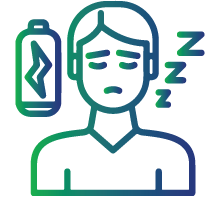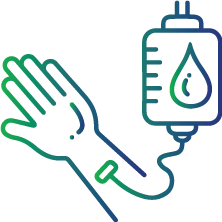
Hepatitis B Surface Antigen (HBsAg), CLIA/ELISA Test
Hepatitis B Surface Antigen (HBsAg), CLIA/ELISA
Hepatitis B Surface Antigen test is used to detect Hepatitis B surface antigen (HBsAg) in the blood. This test helps determine whether or not a person is infected with hepatitis B.
The surface antigen of the hepatitis B virus is a protein that causes the body to produce antibodies after infection. Hepatitis B surface antigen (HBsAg) develops six to sixteen weeks after exposure and disappears four to eight weeks after acute infection symptoms appear. If HBsAg persists for six months or longer, it is indicative of a chronic hepatitis B infection or chronic carrier state and requires immediate medical attention.
Enzyme-linked immunosorbent assay (ELISA) and Chemiluminescent Microparticle Immunoassay (CLIA) are two immunoassay methods used for detecting hepatitis B antigens in the blood sample. Healthcare providers will recommend Hepatitis B surface Antigen (HBsAg), CLIA/ELISA testing to screen for, detect, and help diagnose acute and chronic HBV infections.
This test is also known as Hepatitis B Surface Antigen CLIA, HBsAg CLIA BLOOD
Symptoms of Hepatitis B
The common symptoms of Hepatitis B include:

Fatigue

Nausea

Loss of appetite

Muscle aches

Fever

Jaundice

Dark coloured urine

Stomach pain

Swelling with fluid in your belly or arms and legs

Confusion
Who should get tested for Hepatitis B?
Risk factors for hepatitis B infection include

Having sex with someone infected with the virus

Living with someone who is infected

Men who have had sex with other men

Sharing needles, syringes, or other drug injection equipment

Being a child born to a mother who is infected

Working in hospitals or clinics and being exposed to infected person’s blood

Receiving an organ transplant or blood transfusion (With active screening, the risk of infection is minimized.)
Test preparation:
No special preparation is required for Hepatitis B surface Antigen (HBsAg), CLIA/ELISA test
Interpretation of results
The units of measurement for the results are international units per milliliter (IU/mL)
|
Hepatitis b surface antigen; HBsAg, Quantitative |
Result in IU/mL |
|
Non-Reactive |
<0.05 |
|
Reactive |
>=0.05 |
Interpretation of the results
· A reactive or positive result is indicative of acute or chronic hepatitis B virus (HBV) infection, or chronic HBV carrier state.
· A nonreactive or negative result means that no hepatitis B surface antigen was found.
FAQs
How is the sample collected for Hepatitis B surface Antigen (HBsAg), CLIA/ELISA test?
A blood sample is taken from a vein in the arm using a fine needle. This procedure typically takes no longer than five minutes
What are the risks involved in a Hepatitis B surface Antigen (HBsAg), CLIA/ELISA test?
This test involves negligible risk. There might be slight pain or tenderness around the site where the needle went in. Rarely, the site can become infected
What is the turnaround time (TAT) for the result of a Hepatitis B surface Antigen (HBsAg), CLIA/ELISA test?
Hepatitis B surface Antigen (HBsAg), CLIA/ELISA test result is usually available within 3 days, although it could take longer at times
When is screening for Hepatitis B recommended?
Your blood may be screened for the hepatitis B virus (HBV) if you are displaying hepatitis B infection symptoms. Screening allows your health care provider to know whether you could benefit from vaccination, or if you have active or chronic hepatitis B and require counselling, care, or treatment. You may also be routinely screened if you are pregnant, need immunosuppressive therapy, have end-stage renal disease, or are donating blood or tissue. You will also be advised to get a screening test for hepatitis B if you are at higher risk of contracting HBV
What are the treatments available for hepatitis B infection?
Your health care provider may give you a shot of hepatitis B immunoglobulin and the first dose of the hepatitis B vaccine. This combination of antibodies will offer short-term protection from the virus. Both vaccines can be given up to a week after exposure, but they work best to stop infection if taken within 48 hours. If you are diagnosed with acute hepatitis B, you may be advised to get regular blood tests to ensure that you do not develop chronic hepatitis.
Other lifestyle changes, like eating a balanced and nutritious diet, and avoiding substances that can harm your liver (alcohol and certain medications), are necessary to manage your infection. After six months, if blood tests reveal that you still have an active infection, your doctor may advise medications to help control the virus and prevent liver damage

